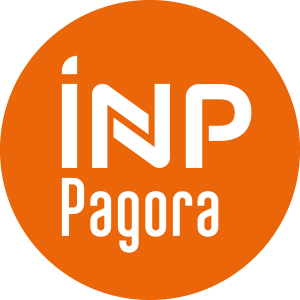Number of hours
- Lectures -
- Projects -
- Tutorials 10.0
- Internship -
- Laboratory works -
- Written tests -
ECTS
ECTS 25.0
Goal(s)
Learning outcomes:
- Introduce the role, organization and operation of a company's maintenance department through a visit to the department;
- Implement the quality function deployment tool;
- Use problem-solving tools and techniques;
- Work in groups on case studies within a limited time frame.
For apprentice masters and their colleagues present during the “maintenance and continuous improvement” day:
- tackle concrete problems (case studies) and obtain, where appropriate, new avenues of investigation;
- enrich discussions with testimonials and additional technical details.
Bernard PINEAUX
Content(s)
FOR ACCESS TO SUPPORT DOCUMENTS, SEE THE LINK TOWARD THE "CHAMILO" WEBSITE IN THE "BIBLIOGRAPHY" HEADING
Three independent parts:
Three independent parts:
1) Visit in the maintenance department:
Each apprentice must schedule a stay in his company's maintenance department (during the February-March period at the latest) and write a report including the following points:
- staff numbers
- activities
- reporting relationship, link with production
- planning and organization, formalized procedures
- maintenance activity management and performance indicators
- skills, security clearance, staff training
- subcontracting and warranty contracts
- tools available: workshop, measuring equipment, etc.
2) Individual QFD:
Consideration of customer needs is one of the prerequisites for ISO 9001 certification. The QFD approach enables these needs to be converted into technical specifications.
The task consists in building a QFD listing
- prioritized customer needs
- the technical specifications needed to meet them,
- the correlations between these first two items,
- the technical difficulties associated with the specifications,
- correlations between specifications, where applicable (roof of the house),
- defects associated with prioritized expectations (right-hand side of the matrix).
This work is carried out individually within each apprentice's company, in partnership with the tutor and/or the person in charge of quality. It requires a visit to the company's quality department, or in the company of the relevant contacts if no such department exists. The visit must therefore be scheduled for February-March at the latest.)
All information contained in the completed QFD remains confidential and will not be divulged under any circumstances.
The apprentice will have to define the customers (who may be internal customers if the context and the criticality of their expectations lend themselves to this).
Their expectations and the importance of these expectations can be established on the basis of (validated) customer complaints, or existing specifications.
The specifications needed to meet these expectations may have already been put in place, be the fruit of group work on an improvement project, or be the result of the apprentice's own reflection.
3) Maintenance and continuous improvement day:
The day covers a number of concrete, documented problems. These problems may concern maintenance, product quality (anomalies, irregularities) or process implementation. They may be of a technical or organizational nature, but require technical knowledge. Each problem will be presented in context, answering the questions Who, What, Where, When, How, How much, Why? The presentation can be based on samples and/or recordings (traces of measurements, controls, settings).
Apprentices and apprentice masters who volunteer to share their experience of problems encountered (solved or not) are called upon, firstly, to help a working group establish a diagnosis (probable causes) and, secondly, to complete this diagnosis by testifying to the approach adopted internally and, where appropriate, to the resolution of the problem.
This will enable apprentices and their colleagues present during the “Maintenance and Continuous Improvement” day to 1. tackle concrete problems (case studies) and obtain, where appropriate, new avenues of investigation; 2. enrich the debate with testimonials and additional technical details.
Based on the answers to the 5W2H questions, the search for causes and then solutions can be based on the 5 M method or any other diagnosis tool.
Each working group will present its conclusions, hypotheses and avenues of investigation in a maximum of 10 slides.
If time permits, a half-day of practice in problem-solving tools (case study) will be offered in January or February (Thursday afternoon).
Course of the day (health constraints permitting):
8:30-8:45: welcome
8.45am-9.15am: presentation of the cases proposed by the companies
9:15-10:15: work sessions in small groups
10:15-10:30: break
10:30-11:30: working sessions
11h30-12h : informal presentation of the methodologies used by each group to the teachers in charge (in order to rectify the approach if necessary)
12h-13h : lunch
1pm-2:30pm : preparation of the presentations
2:30-4:30 pm: presentation of the results
4:30-5:00 pm: debriefing, assessment
The apprenticeship masters, or any person likely to bring clarifications on a given problem, will be able, if they cannot be present at this day, to connect by videoconference to work with the apprentices who deal with the problem.
Evaluation: the functioning of the group, the methodology used, the respect of the specifications, the quality of the presentation and the answers to the questions will allow the teachers in charge to give a grade to the members of each group.
Apprentices who have brought a problem to solve may, if the problem lends itself to it, also play the role of facilitator or expert: their evaluation will take this additional service into account.
The current health constraints will be applicable and may modify the format of this day. The problem-solving sequences can therefore be held at a distance if necessary.
PrerequisitesQuality & management" course (4FMT1140).
Accessibility for people with disabilities: consult us
Evaluation : Description of evaluation conditions in the ‘Evaluation’ field
Resit : Description of evaluation conditions in the ‘Evaluation’ field
1) Visit in the maintenance department:
Report of no more than 3 pages (font size 12, single spaced), due in hard copy and electronically by a pre-determined date.
The document is submitted to the instructor in paper and digital format (deposit on the Chamilo platform) by a deadline.
This document is not graded.
2) Individual QFD:
Submission of a report including the "quality house" (excel file) and associated explanations/interpretations. The document is given to the teacher in paper and digital format (deposit on the Chamilo platform) before a deadline.
The N1 grade of the report represents 30% of the final grade.
This can be made up in case of justified non submission of the report.
3) "Maintenance and continuous improvement" day:
Each working group presents its conclusions, hypotheses and lines of investigation in 6 slides. This presentation is evaluated. The N2 grade represents 70% of the final grade. This grade cannot be made up in case of absence.
The course exists in the following branches:
- Curriculum - Pagora Engineer - Apprentice - Semester 8
Course ID : 4FMA2142
Course language(s): 
You can find this course among all other courses.
Environmental security
Pas de contrainte dans le déroulement de cette journée, si ce n'est d'intégrer la sécurité et l'environnement aux réflexions des groupes de travail.
Les enseignements ont lieu dans des salles de cours ou des salles informatiques.
Penser à éteindre ordinateurs et lumières en quittant la salle.
No constraint during this day, but safety and environment issues may be assessed by the working groups as they are trying to solve a problem.
Teaching takes place in classrooms.
Turn off computers and lights when leaving the classroom or computer room.
Identique à celle des cours prérequis.
Identical to that of the prerequisite courses.
Certains éléments bibliographiques sont disponibles sur le site Internet Chamilo / some bibliographic elements are available on the Chamilo Web site :
https://chamilo.grenoble-inp.fr/courses/PAGORAA23FM03908/index.php?id_session=0



